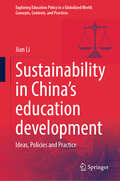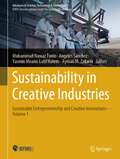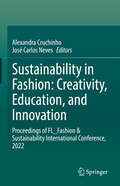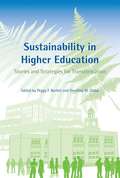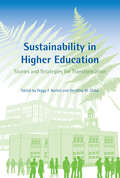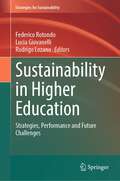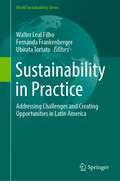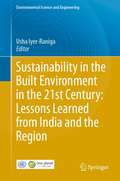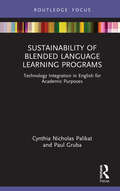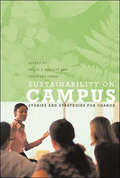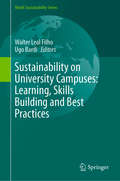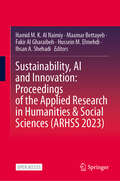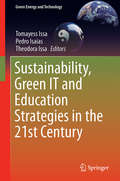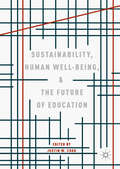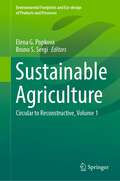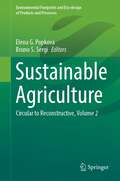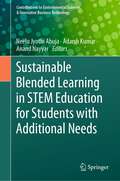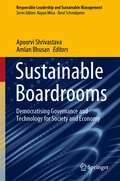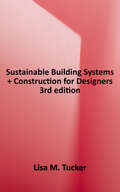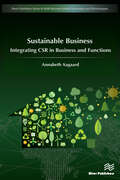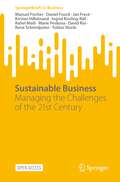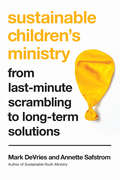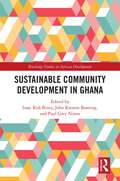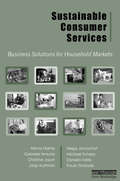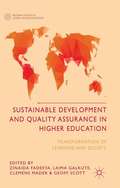- Table View
- List View
Sustainability in China’s education development: Ideas, Policies and Practice (Exploring Education Policy in a Globalized World: Concepts, Contexts, and Practices)
by Jian LiThis book analyzes the concept of 'comprehensive educational sustainability in China' from the perspectives of ideas, policies, and practices. It provides a holistic overview of educational sustainability in China, covering topics such as: the sustainable life-circle model of teacher education policy, the quest for sustainable basic education reform, the sustainable development of vocational education and higher education, and teacher exchange and rotation policy for sustainable education reforms. This book serves as a valuable resource for scholars and researchers who are interested in/working on research on educational sustainability in China, as well as administrators and stakeholders in the Chinese international education system, and graduate students who major or minor in the field of sustainable education.
Sustainability in Creative Industries: Sustainable Entrepreneurship and Creative Innovations—Volume 1 (Advances in Science, Technology & Innovation)
by Muhammad Nawaz Tunio Angeles Sánchez Yasmin Moanis Latif Hatem Ayman M. ZakariaThis book discusses a compelling array of topics at the intersection of entrepreneurship, education, and technological innovation within the creative industries. It delves into a captivating exploration of sustainable entrepreneurship in Part 1, where key characteristics of sustainable entrepreneurs and factors influencing entrepreneurial intention are dissected. By unearthing the nexus between entrepreneurial alertness, networking capability, and venture performance, it provides intriguing insights into sustaining traditional crafts and brands amid the COVID-19 pandemic. The following parts not only unveil current innovative pedagogical strategies in creative design education but propels you into the future, exploring the harmonious fusion of academia and industry in sustainability-driven programs. Designed for educators, students, researchers, and practitioners in entrepreneurship, design, and technology fields, this book offers a transformative journey into sustainable practices, innovative pedagogies, and cutting-edge advancements. Engaging, informative, and thought-provoking, it is a must-read for those seeking to shape the future of creative industries through entrepreneurship, education, and innovation.
Sustainability in Fashion: Proceedings of FL_Fashion & Sustainability International Conference, 2022
by Alexandra Cruchinho José Carlos NevesSustainability in Fashion: Creativity, Education, and Innovation is a book that focuses on how sustainability can be integrated into the fashion and clothing industry. The set of chapters provides peer-reviewed research covering a wide range of topics, mainly focused on how sustainability can be incorporated into fashion and textile education, how consumer behaviour and marketing affect sustainability in fashion (and vice versa) and how circular economy principles can be incorporated into clothing and textile supply chains. The chapters in this proceedings volume examine sustainability not only from the perspective of academia, but also from the perspective of industry. Working across sectors in this manner can facilitate the development of real projects that can greatly contribute to sustainability in the fashion industry.
Sustainability in Higher Education
by Peggy F. Barlett Geoffrey W. ChaseIn colleges and universities across the United States, students, faculty, and staff are forging new paths to sustainability. From private liberal arts colleges to major research institutions to community colleges, sustainability concerns are being integrated into curricula, policies, and programs. New divisions, degree programs, and courses of study cross traditional disciplinary boundaries; Sustainability Councils become part of campus governance; and new sustainability issues link to historic social and educational missions. In this book, leaders from twenty-four colleges and universities offer their stories of institutional and personal transformation. These stories document both the power of leadership -- whether by college presidents, faculty, staff, or student activists -- and the potential for institutions to redefine themselves. Chapters recount, among other things, how inclusive campus governance helped mobilize students at the University of South Carolina; how a course at the Menominee Nations tribal college linked sustainability and traditional knowledge; how the president of Furman University convinced a conservative campus community to make sustainability a strategic priority; how students at San Diego State University built sustainability into future governance while financing a LEED platinum-certified student center; and how sustainability transformed pedagogy in a lecture class at Penn State. As this book makes clear, there are many paths to sustainability in higher education. These stories offer a snapshot of what has been accomplished and a roadmap to what is possible. Colleges and Universities covered include Arizona State University - Central College, Iowa - College of the Menominee Nation, Wisconsin - Curriculum for the Bio-region Project, Pacific Northwest - Drury University, Missouri - Emory University, Georgia - Florida A&M University - Furman University, South Carolina - Green Mountain College, Vermont - Kapolani Community College, Honolulu, Hawaii - Pennsylvania State University -San Diego State University - Santa Clara University, California - Slippery Rock State University, Pennsylvania - Spelman College, Georgia - Unity College, Maine - University of Hawaii--Manoa - University of Michigan - University of South Carolina - University of South Florida - University of Wisconsin--Oshkosh - Warren Wilson College, North Carolina - Yale University
Sustainability in Higher Education: Stories and Strategies for Transformation (Urban and Industrial Environments)
by Peggy F. Barlett Geoffrey W. ChaseCampus leaders describe how community colleges, publicly funded universities, and private liberal arts colleges across America are integrating sustainability into curriculum, policies, and programs.In colleges and universities across the United States, students, faculty, and staff are forging new paths to sustainability. From private liberal arts colleges to major research institutions to community colleges, sustainability concerns are being integrated into curricula, policies, and programs. New divisions, degree programs, and courses of study cross traditional disciplinary boundaries; Sustainability Councils become part of campus governance; and new sustainability issues link to historic social and educational missions. In this book, leaders from twenty-four colleges and universities offer their stories of institutional and personal transformation. These stories document both the power of leadership—whether by college presidents, faculty, staff, or student activists—and the potential for institutions to redefine themselves. Chapters recount, among other things, how inclusive campus governance helped mobilize students at the University of South Carolina; how a course at the Menominee Nation's tribal college linked sustainability and traditional knowledge; how the president of Furman University convinced a conservative campus community to make sustainability a strategic priority; how students at San Diego State University built sustainability into future governance while financing a LEED platinum-certified student center; and how sustainability transformed pedagogy in a lecture class at Penn State. As this book makes clear, there are many paths to sustainability in higher education. These stories offer a snapshot of what has been accomplished and a roadmap to what is possible.Colleges and Universities CoveredArizona State University • Central College, Iowa • College of the Menominee Nation, Wisconsin • Curriculum for the Bio-region Project, Pacific Northwest • Drury University, Missouri • Emory University, Georgia • Florida A&M University • Furman University, South Carolina • Green Mountain College, Vermont • Kap'olani Community College, Honolulu, Hawaii • Pennsylvania State University •San Diego State University • Santa Clara University, California • Slippery Rock State University, Pennsylvania • Spelman College, Georgia • Unity College, Maine • University of Hawaii–Manoa • University of Michigan • University of South Carolina • University of South Florida • University of Wisconsin–Oshkosh • Warren Wilson College, North Carolina • Yale University
Sustainability in Higher Education: Strategies, Performance and Future Challenges (Strategies for Sustainability)
by Rodrigo Lozano Federico Rotondo Lucia GiovanelliThis contributed volume addresses the issue of how higher education institutions can systematically reorient themselves to help society become more sustainable. In particular, a strategic management approach is used to overcome the fragmentation of sustainability initiatives increasingly conducted by higher education institutions worldwide. In this book, eminent scholars in the field of sustainability in higher education combine their different backgrounds to propose conceptual frameworks for interpreting and measuring sustainability integration in higher education institutions. The chapters contained herein explore which processes and management tools should be used, as well the challenges to be faced, to make sustainable innovation effective. The cases present in this volume offer a guide for higher education institution management to lead the sustainability transition.
Sustainability in Practice: Addressing Challenges and Creating Opportunities in Latin America (World Sustainability Series)
by Walter Leal Filho Fernanda Frankenberger Ubirata TortatoSustainability is now a widely spread concept, and much progress has been achieved since the 1970s, when it started to be widely discussed. At present, many international organizations and scientists are active in implementing sustainable development as a whole and the UN Sustainable Development Goals (SDGs) in particular. Nevertheless, the main research agenda is being led by some countries, providing a good opportunity for other nations and regions which have not yet been so active, to bring their viewpoints to the global discussion. One of these regions is Latin America. Consistent with the need for more cross-sectorial and cross-cultural interactions among the various stakeholders working in the field of sustainability in Latin America and beyond, this book pursues two main aims: a) to provide research institutions, universities, NGOs, government agencies, and enterprises from the region with an opportunity to present their works in the field of sustainability and b) to document and promote ideas and experiences acquired in the execution of sustainability projects, especially successful initiatives and good practice across the Latin America region. Last but not least, a further aim of the book is to present methodological approaches and experiences deriving from case studies and projects, which aim to show how sustainability may be enhanced in practice.
Sustainability in the Built Environment in the 21st Century: Lessons Learned from India and the Region (Environmental Science and Engineering)
by Usha Iyer-RanigaThis book follows on previous works addressing sustainable development research in the Asia-Pacific region. It mainly focuses on India, a country currently facing immense challenges in the form of climate change, rapid urbanisation, and population pressures in its journey to help achieve the Sustainable Development Goals. Expecting to surpass China in terms of population in the near future, India needs to develop its own solutions in order to uphold its commitments under the Paris Agreement. This book makes a contribution in that direction by presenting case studies on various aspects of the built environment, from education to managing cities, procurement, and considerations for a circular economy. The papers gathered here offer a vital resource for government policymakers, educators, and current and future professionals, equipping them with the knowledge and expertise they need in order to overcome today’s complex challenges in the built environment.
Sustainability of Blended Language Learning Programs: Technology Integration in English for Academic Purposes (Routledge Focus on Applied Linguistics)
by Paul Gruba Cynthia Nicholas PalikatThis book focuses on the investigation of the sustainability of technology integration in the context of language programs and is based around an 18-month longitudinal study of a blended EAP (English for Academic Purposes) language program situated within a university pathways course. The integration of technology into language teaching and learning in academic English programs often demands substantial investment in professional development, curriculum change, and technological resources. Given the intense effort required, sustainability of such efforts has gained importance, focus, and urgency. Situated in the context of English for Academic Purposes (EAP) programs, this book frames, and investigates, the sustainability of technology integration through a series of case studies of specific technologies: tablet devices, a Learning Management System, and an interactive presentation app. The authors explore sustainable integration of technology; the use of argument-based approaches as a basis for research design; and participant ethnography as a form of data collection. The book concludes by looking at the implications of the research and proposes that change management concepts be applied to better introduce, implement, and most importantly, sustain change involving educational technology integration. The content will be of interest to scholars in TESOL and applied linguistics as well as professional language educators who will benefit from insights into sustaining technology integration in their programs.
Sustainability on Campus: Stories and Strategies for Change (Urban and Industrial Environments)
by Peggy F. Barlett Geoffrey W. ChaseStories both practical and inspirational about environmental leadership on campus.These personal narratives of greening college campuses offer inspiration, motivation, and practical advice. Written by faculty, staff, administrators, and a student, from varying perspectives and reflecting divergent experiences, these stories also map the growing strength of a national movement toward environmental responsibility on campus.Environmental awareness on college and university campuses began with the celebratory consciousness-raising of Earth Day, 1970. Since then environmental action on campus has been both global (in research and policy formation) and local (in efforts to make specific environmental improvements on campuses). The stories in this book show that achieving environmental sustainability is not a matter of applying the formulas of risk management or engineering technology but part of what the editors call "the messy reality of participatory engagement in cultural transformation."In Sustainability on Campus campus leaders recount inspiring stories of strategies that moved eighteen colleges and universities toward a more sustainable future. This book is for faculty, students, administrators, staff, and community partners, whether hesitant or committed, knowledgeable or newcomer. Scholars and activists have recognized the crucial role that higher education can play in the sustainability effort, and each chapter in the book is full of ideas about how to get started, revitalize efforts, and overcome roadblocks. Human and at times joyful, these stories illustrate many forms of leadership, in new courses and faculty development, green buildings and administrative policies, student programs, residential life, and collaborations with local communities.
Sustainability on University Campuses: Learning, Skills Building and Best Practices (World Sustainability Series)
by Ugo Bardi Walter Leal FilhoThe implementation of sustainability initiatives on campuses is an essential component of promoting sustainability in the higher education context. In addition to reflecting an awareness of environmental issues, campus programmes demonstrate how seriously universities take sustainability at the institutional level.There is a lack of truly interdisciplinary publications that comprehensively address the issue of campus greening, and there is an even greater need for publications that do so at a truly international level. This book meets these needs. It is one of the outcomes of the “Second Symposium on Sustainability in University Campuses” (SSUC-2018), which was jointly organised by the University of Florence (Italy), Manchester Metropolitan University (UK), the Research and Transfer Centre “Sustainable Development and Climate Change Management” and the “European School of Sustainability Science and Research” at the Hamburg University of Applied Sciences (Germany), in cooperation with the Inter-University Sustainable Development Research Programme (IUSDRP).The book showcases examples of campus-based research and teaching projects, regenerative campus design, low-carbon and zero-carbon buildings, waste prevention, and resilient transport, among others. Ultimately, it demonstrates the role of campuses as platforms for transformative social learning and research, and explores the means by which university campuses can be made more sustainable.The aims of this publication are as follows:• to provide universities with essential information on campus greening and sustainable campus development initiatives from around the world;• to share ideas and lessons learned in the course of research, teaching and projects on campus greening and design, especially successful initiatives and good practice; and• to introduce methodological approaches and projects intended to integrate the topic of sustainable development in campus design and operations.This book gathers contributions from researchers and practitioners in the field of campus greening and sustainable development in the widest sense, from business and economics, to the arts, administration and the environment, and hailing from Europe, Latin America, North America and Asia.
Sustainability, AI and Innovation: Proceedings of the Applied Research in Humanities & Social Sciences (ARHSS 2023)
by Hamid M. K. Al Naimiy Maamar Bettayeb Hussein M. Elmehdi Ihsan A. Shehadi Fakir Al GharaibehThis open-access book presents the proceedings of the first 1st International Conference on Applied Research in Humanities & Social Sciences (ARHSS) held from Oct 31 to Nov 02, 2023, at the University of Sharjah, United Arab Emirates. It showcases the latest advances in research related to digital, ethical, and advanced crime prevention and enhancing social security. In addition, the topics include sustainability and innovation in economy, society, and governance (ESGs). The topics also tackle current issues, focusing on Artificial Intelligence (AI) and its wide applications in humanities and social sciences. Given its scope, the book is essential for scholars, students, policy-makers, and education practitioners interested in better keeping up with the latest advances in this critical field.
Sustainability, Green IT and Education Strategies in the Twenty-first Century
by Pedro Isaias Tomayess Issa Theodora IssaThis work presents and discusses the latest approaches and strategies for implementing Sustainability and Green IT into higher education and business environments. Following the global financial crisis in 2007/2008, businesses began to struggle coping with the increased IT/IS cost and their environmental footprint. As a consequence, action by universities to incorporate sustainability and ‘Green IT’ as parts of their teaching and learning materials, acknowledging their importance for global and local businesses, is being increasingly implemented. The book addresses the cooperation and coordination between academics and practitioners needed in order to achieve the changes required to obtain sustainability.Intended for researchers, lecturers and post-graduate students, as well as professionals in the Information Society and ICT and education sectors, and policy makers.
Sustainability, Human Well-Being, and the Future of Education
by Justin W. CookThis open access book explores the key dimensions of a future education system designed to enable individuals, schools, and communities to achieve the twin twenty-first century challenges of sustainability and human well-being. For much of the twentieth century, Western education systems prepared students to enter the workforce, contribute to society and succeed in relatively predictable contexts. Today, people are at the controls of the planet—making decisions that are dramatically reshaping social, economic, and environmental systems at a global scale. What is education’s purpose in this new reality? What and how must we learn now? The volatility and uncertainty caused by digitalization, globalization, and climate change weave a common backdrop through each chapter. Using case studies drawn from Finland and the US, chapter authors explore various aspects of learning and education system design through the lenses of sustainability and human well-being to evaluate how our understanding and practice of education must transform. Using their scholarly research and experience as practitioners, the authors propose new approaches to preparing learners for a new frontier of the human experience fraught with risks but full of opportunity.
Sustainable Agriculture: Circular to Reconstructive, Volume 1 (Environmental Footprints and Eco-design of Products and Processes)
by Elena G. Popkova Bruno S. SergiThis book highlights the environmental footprints and best practices in sustainable agriculture. This first volume includes forty-four interesting chapters that present agriculture in the light of food security, circular economy, sustainability, food exports and imports written by leading experts in the field. It provides and interesting read for researchers, policy makers and professionals in the area of agriculture and economy.
Sustainable Agriculture: Circular to Reconstructive, Volume 2 (Environmental Footprints and Eco-design of Products and Processes)
by Elena G. Popkova Bruno S. SergiThis book highlights the environmental footprints and best practices in sustainable agriculture. This second volume includes fifteen interesting chapters that present agriculture in the light of forest conservation, circular economy, climate change, sustainability, food security during pandemics and soil conservation, written by leading experts in the field. It provides and interesting read for researchers, policy makers and professionals in the area of agriculture and economy.
Sustainable Blended Learning in STEM Education for Students with Additional Needs (Contributions to Environmental Sciences & Innovative Business Technology)
by Anand Nayyar Adarsh Kumar Neelu Jyothi AhujaThis book comprehensively covers sustainable blended learning approach in each of the STEM (science, technology, engineering and mathematics) disciplines. The book also includes the compilation of detailed concepts of blended learning ranging from definition, need, features, models, advantages and disadvantages and comparisons with traditional face-to-face learning. Sustainable blended learning in K-12 education has an immense role as foundation to learning for students in their early education. Fostering creativity and inculcating problem solving and critical thinking skills are the integral aspect of STEM education, which encourages students to pursue them to for their future careers. This book presents recent practices taken by experts at various levels to promote education in STEM. Furthermore, impact over teacher–student relationships is analyzed. Lastly, sustainable frameworks, strategies and implementation to incorporate students with additional needs are explored.
Sustainable Boardrooms: Democratising Governance and Technology for Society and Economy (Responsible Leadership and Sustainable Management)
by Apoorvi Shrivastava Amlan BhusanThis book discusses various interactions in the sustainability and development sector. It presents a thematic approach to describe progressive models and cases on disruptions, innovations, regulatory and institutional evolution related to the area of sustainability, through an organizational and boardroom level governance lens. It documents how certain schools of thought, models of engagement and methods-platforms-practices impact society and while doing so, brings together varying theoretical debates, practicing models and instruments of transformation in green governance. Sustainable policy making demands a whole of government approach in decision-making processes. Further, inclusiveness and ‘green’ consciousness of corporate boardrooms are paramount, without which, effective socially responsible business practices are absurd. Human resource development, shaped on sustainable corporate ethics, requires well-trained sustainability specialists, managers that can think ‘green’ in their overall decision making which are essential for green governance. In this context, the book creates a functional, interpretive repertoire of stories, commentaries, life experiences, and reflections of corporate leaders, academics, and practicing consultants, on their decision-making processes, and how they interpret sustainability. These stories and thoughts help create a functional academic construct, which will assist academics teach ‘green’ competencies to business school students better, and entrepreneurs and business executives to better understand the idea of sustainable growth.
Sustainable Building Systems and Construction for Designers: Bundle Book + Studio Access Card, Third edition
by Lisa M. TuckerAuthor Lisa M. Tucker covers topics in a holistic approach, from the structural (site consideration and foundations) to the experiential (indoor air, acoustics, and safety), making a clear case for interior design professionals to understand their moral responsibilities to people and the environment, and to follow sustainable building practices. Now in its third edition, the award-winning Sustainable Building Systems and Construction for Designers has been updated to reflect current CIDA accreditation standards and include recent industry trends related to interior construction, such as security and well-being. Additionally, a complete set of new case studies has been commissioned. Line drawings, color photography, and sample student work join together to support student learning on this essential and timely topic. New to this Edition: -Updated with CIDA Standards 2018 -Expanded content on security, resilience, plumbing, and well-being design trends -Complete set of 7 new case studies -First edition to include STUDIO with self-assessment questions and flashcards and Instructor Resources including an instructor's guide and PowerPoint slides
Sustainable Business: Integrating CSR in Business and Functions (River Publishers Series In Multi Business Model Innovation, Technologies And Sustainable Business Ser.)
by Annabeth AagaardThe developments in our environment and society has made it clear that the way we run our businesses and govern our nations is not sustainable in the long run. This is also why more and more companies and organizations are pursuing sustainable business through various Corporate Social Responsibility (CSR) activities. However, many companies experience that although they facilitate a CSR strategy on corporate level, CSR is often not embedded in their business and/or integrated across their functions. If companies are to achieve the full business potential and performance impact of CSR, sustainability has to be operationalized, targeted and measured across the value chain through empowered employees and in alignment with the business strategy of the company. Though state-of-the-art CSR research, theories and models, the theoretical platform for sustainable business and CSR is presented in this book. However, CSR is carried out in practice, and not just in theory. This is why each chapter is supplemented with practical case examples explaining the way in which different companies and their managers have integrated sustainable business in their strategy and across the organizations’ different functions. As is evident both in theory and practice, the success of CSR integration is highly affected by industrial context, as the unique characteristics of the industry have an impact on the key sustainability challenges and business opportunities of the specific company and industry. In support of this evidence, the book also reveals how CSR can be implemented across private and public organizations as well as small & medium sized entities (SMEs).
Sustainable Business: Managing the Challenges of the 21st Century (SpringerBriefs in Business)
by René Schmidpeter Manuel Fischer David Risi Ingrid Kissling-Näf Daniel Foord Jan Frecè Kirsten Hillebrand Rahel Meili Marie Peskova Tobias StuckiThis open access book is a compact guide to the development of sustainable business, which has become the central concept in discussions about the future development of humanity and planet earth. It provides basic terminology and concepts on sustainable business and offers insights into a new management paradigm that integrates social and environmental dimensions into business models, strategies, and operations. New business concepts such as the donut economy, the circular economy, social innovation and sustainable leadership are introduced and the book outlines how they influence the way we run businesses today and in the future. This book lays the foundation for new management thinking in business and academia, making it a essential reader for professionals and students alike.
Sustainable Children's Ministry: From Last-Minute Scrambling to Long-Term Solutions
by Mark DeVries Annette SafstromSustainable Children’s Ministry
Sustainable Community Development in Ghana (Routledge Studies in African Development)
by John Kwame Boateng Isaac Kofi Biney Paul Gary NixonThis book explores sustainable community development in Ghana post-COVID-19, highlighting examples of how individuals facing extreme challenges have adapted to their changing circumstances.Through the voices of African researchers, it explores the different responses that local, subnational, and national stakeholders and communities initiated to preserve the gains made in achieving the Sustainable Development Goals in Ghana during the global pandemic. This collection considers how policy makers are tackling the pressing issues of sustainability, climate change and its effects on Africa and Ghana in particular, and multi-stakeholder policy responses to building communities in a post-COVID-19 world. The case studies show how communities are interacting to ensure sustainable community development and learning in the Global South, and the role that education and learning, both formal and informal, play in strengthening livelihoods, choices, and opportunities in African communities.An assessment of multi-stakeholder policy responses to building communities in Ghana, this book will be of interest to scholars and students in the field of Education, Education Management, Sociology, Economics, and African Studies. It will also be of interest to policy makers and practitioners engaged in community development programmes and activities and the development of associated policies.
Sustainable Consumer Services: Business Solutions for Household Markets
by Minna HalmeThe goal for consumer oriented business should be to make a profit and to do it without costing the Earth. Yet exactly how to satisfy the needs and wants of consumers without contributing to environmental degradation is proving to be the essential, but elusive goal for businesses in the 21st century. The leading solution is to substitute material consumption with the consumption of services that offer consumers convenience and value but eliminate much of the inefficiency and waste associated with our throw-away society. Sustainable consumer services for households - services that are delivered to consumers at the premises such as home delivery of organic food, appliance leasing, mobile laundry services, internet marketing of homeservices or car pool schemes - provide a key part of the answer of how to reduce material consumption and waste while still turning a profit. Yet until now there has been little information to guide the development of such business models and practices, and to develop ways to make service-based consumption more attractive to consumers than object-ownership-based models. This book, equally a practical business handbook and business course text, provides the missing link in sustainable household service competitiveness by examining the issues, looking at business models, providing dozens of real-life best-practice examples and presenting data from the first large-scale consumer survey that explains consumer behaviour and what they want from home service provision. The book is an essential resource for businesses and public or nonprofit organizations and housing organizations entering the growing consumer services market. It provides a wealth of business know-how on what works and what doesn?t, how to avoid potential pitfalls, and how to provide consumer services at the household level that are profitable, environmentally sustainable and that add to consumers? quality of life.
Sustainable Development And Quality Assurance In Higher Education
by Zinaida Fadeeva Laima Galkute Clemens Mader Geoff ScottTo help address the challenges of sustainable development, higher education institutions must transform themselves, bringing together best practice in quality management for tertiary education with best practice in education for sustainable development. This book provides tested strategies and pathways for undertaking this successfully.
